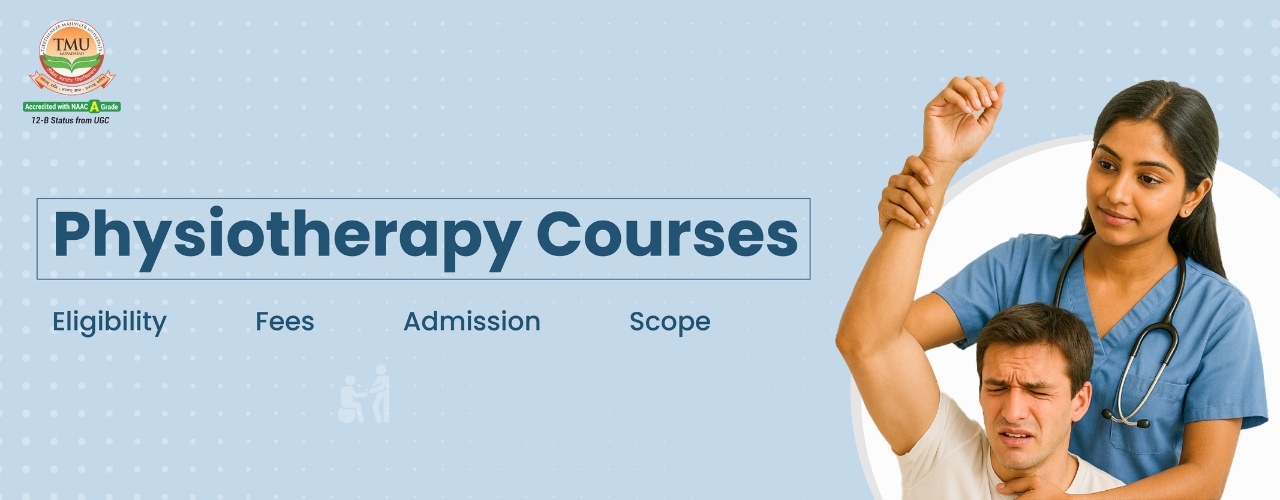Physiotherapy Courses: Eligibility, Fees, Admission and Scope
Table of Contents
Physiotherapy, also known as physical therapy, is a healthcare profession focused on the rehabilitation, prevention, and treatment of physical impairments, disabilities, and mobility disorders. It involves a combination of manual therapy, exercise, and electro-physical modalities aimed at enhancing a patient’s functional capacity. Whether it’s a sports injury, post-surgical rehab, chronic pain, or even neurological disorders like stroke, physiotherapy plays a crucial role in helping individuals regain movement and function.
A physiotherapy course focuses on promoting movement, enhancing physical function, and improving overall quality of life through targeted physical interventions. This field goes beyond treating injuries—it empowers individuals to regain mobility, confidence, and independence.
By studying a physiotherapy course, students learn evidence-based techniques, rehabilitation strategies, and patient-centered care methods that make a tangible difference in people’s lives. The program prepares aspiring physiotherapists to work in hospitals, clinics, sports organizations, and rehabilitation centers, where they can apply their skills to restore health and transform lives.
Importance of Physiotherapy in Healthcare
In today’s fast-paced world, sedentary lifestyles, increased screen time, and stress have given rise to musculoskeletal and postural problems. Additionally, with rising awareness about health, more people seek non-invasive and drug-free treatment options—making physiotherapy increasingly relevant.
Physiotherapists are key players in the multidisciplinary healthcare team. They work with orthopedic doctors, neurologists, and general practitioners to develop personalized rehabilitation plans. Their contributions are indispensable, especially in post-operative recovery, sports therapy, and geriatric care.
Moreover, with an aging population and growing incidence of chronic diseases like arthritis, diabetes, and stroke, the demand for skilled physiotherapists is higher than ever. It’s a profession that not only pays well but also offers the deep satisfaction of healing and helping others.
Types of Physiotherapy Courses
Diploma Courses in Physiotherapy
Diploma courses offer an entry-level understanding of physiotherapy and are ideal for students who want to quickly enter the field. These courses typically last 1.5 to 2 years and focus on basic physiotherapeutic techniques, anatomy, and practical skills.
Some popular diploma programs include:
- Diploma in Physiotherapy (DPT)
- Certificate Course in Physiotherapy
These are suitable for support roles like physiotherapy assistants in clinics, nursing homes, or wellness centers.
Undergraduate Courses (BPT)
The Bachelor of Physiotherapy (BPT) is a 4.5-year program that includes a 6-month mandatory internship. It provides a comprehensive education in human anatomy, physiology, pathology, biomechanics, and various therapeutic methods.
BPT is the minimum qualification required to become a licensed physiotherapist. The curriculum includes:
- Electrotherapy
- Exercise Therapy
- Orthopedics and Neurology
- Cardiopulmonary Sciences
Graduates can either start practicing or pursue higher education.
Postgraduate Courses (MPT)
Master of Physiotherapy (MPT) is a 2-year postgraduate program that allows specialization in areas like:
- Orthopedics
- Neurology
- Cardiopulmonary Sciences
- Sports Physiotherapy
- Pediatric Physiotherapy
An MPT degree enhances your job prospects and opens doors to academia, research, and high-paying clinical roles.
Doctoral Programs in Physiotherapy
For those inclined toward research and academia, Ph.D. and Doctor of Physiotherapy (DPT) programs offer advanced training in theoretical and practical aspects of physiotherapy. These programs usually span 3-5 years and require a postgraduate degree in physiotherapy.
Teerthanker Mahaveer University
Apply for Admission
Click Here To Apply for Admission
Eligibility Criteria of Physiotherapy Courses
To pursue a career in physiotherapy, specific eligibility requirements must be met depending on the course level.
Diploma
- 10+2 with at least 50% in any stream (Science preferred)
- Basic knowledge of biology and human anatomy is advantageous
Bachelor’s (BPT)
- 10+2 with Physics, Chemistry, and Biology
- Minimum 50% aggregate
- Some institutes require English as a mandatory subject
Master’s (MPT)
- BPT degree from a recognized university
- Minimum 50–55% marks
- Completion of a 6-month internship post-BPT is usually required
Ph.D. or DPT
- Postgraduate degree (MPT) in relevant specialization
- Often requires entrance exam or interview
Admission Process
There are three common ways students are admitted to physiotherapy programs:
1. Entrance Exams
Some universities and colleges conduct entrance exams such as:
- IPU CET
- CET (State-level)
- NEET (optional in some colleges)
2. Direct Admission
Private institutions often offer direct admissions based on Class 12th results.
3. Merit-Based Selection
Many government and private colleges shortlist students purely based on their academic performance in 10+2.
Course Duration and Curriculum
| Course Level | Duration |
| Diploma | 1–2 Years |
| BPT | 4.5 Years (incl. Internship) |
| MPT | 2 Years |
| Doctorate (Ph.D.) | 3–5 Years |
Key Subjects Covered
The curriculum is designed to offer both theoretical and practical knowledge. Some of the core subjects across various courses include:
- Anatomy and Physiology
- Pathology and Pharmacology
- Biomechanics and Kinesiology
- Electrotherapy and Exercise Therapy
- Clinical Orthopedics, Neurology, and Cardio-Respiratory Conditions
- Research Methodology and Evidence-Based Practice
These subjects help students understand the human body and apply rehabilitation methods effectively.
Clinical Training and Internship
One of the most critical components of any physiotherapy course is hands-on training. BPT and MPT courses include clinical postings in hospitals and rehabilitation centers where students interact with patients under supervision.
The mandatory internship phase, particularly in BPT, allows budding physiotherapists to:
- Apply classroom knowledge in real-life scenarios
- Learn patient management and ethical practices
- Develop communication and counseling skills
- Gain exposure to various specialties like orthopedics, neurology, pediatrics, and geriatrics
Career Scope After Physiotherapy
Job Profiles in Physiotherapy
After completing a degree in physiotherapy, graduates can pursue a range of job profiles such as:
- Clinical Physiotherapist
- Sports Physiotherapist
- Rehabilitation Specialist
- Pediatric Physiotherapist
- Geriatric Physiotherapist
- Orthopedic Physiotherapist
Each specialization allows physiotherapists to work closely with specific patient populations, from athletes to elderly patients.
Work Environments and Industries
Physiotherapists are employed in:
- Hospitals and Clinics
- Sports and Fitness Centers
- Rehabilitation Centers
- NGOs and Community Health Programs
- Academic Institutions
- Home Healthcare Services
Freelancing and starting a private clinic are also popular options that offer flexibility and higher income.
Growth Prospects and Salary
The salary of a physiotherapist depends on qualifications, experience, and location. Entry-level physiotherapists in India earn between ₹20,000 to ₹35,000 per month. With experience and specialization, this can rise to ₹70,000 or more.
In private practice or hospital administration roles, earnings can cross ₹1,00,000 per month. Internationally, physiotherapists can earn even more—especially in countries like Canada, Australia, and the UAE.
Skills Required to Excel in Physiotherapy
Technical Skills
To succeed in the field of physiotherapy, students must master a blend of theoretical and hands-on skills, such as:
- Manual Therapy Techniques: Mobilization, manipulation, and massage.
- Knowledge of Anatomy & Kinesiology: In-depth understanding of musculoskeletal and neurological systems.
- Therapeutic Exercise Prescription: Designing personalized rehab plans.
- Use of Equipment: Proficiency in electrotherapy machines, gait trainers, and assistive devices.
- Assessment Skills: Diagnosing issues through physical exams and movement analysis.
These skills are foundational and are honed during internships, workshops, and continuing education.
Soft Skills
In addition to technical knowledge, physiotherapists must possess:
- Empathy and Patience: Essential for handling chronic patients and those in pain.
- Communication Skills: To explain procedures and build trust with patients.
- Problem-Solving Abilities: Each patient is unique; treatment plans must be tailored.
- Team Collaboration: Often part of a multidisciplinary team with doctors, nurses, and occupational therapists.
- Time Management: Especially in high-volume hospital settings.
Both types of skills are essential for a successful and fulfilling career in physiotherapy.
Challenges Faced in the Physiotherapy Profession
Physical Demands
Physiotherapy is not a desk job—it’s physically intensive. Therapists spend long hours standing, lifting patients, demonstrating exercises, and conducting treatments. Common challenges include:
- Physical Strain: Risk of back pain, wrist injuries, and fatigue.
- Patient Dependency: Some patients require full assistance, adding to the physical workload.
- Burnout: Emotional exhaustion from dealing with slow or non-responsive recovery cases.
Proper ergonomics, regular self-care, and rest are crucial to staying healthy in the profession.
Patient Communication
Working with diverse populations means you must adapt your approach to each patient’s background, language, and emotional state. Challenges include:
- Non-cooperative Patients: Especially those in pain or denial about their condition.
- Emotional Stress: Managing the expectations of patients and families can be draining.
- Compliance Issues: Patients often fail to follow exercise routines or miss appointments.
Training in psychology and communication can help navigate these challenges effectively.
Future of Physiotherapy in India
Technology Integration
The future of physiotherapy is bright, especially with emerging technologies transforming how treatment is delivered:
- Tele-rehabilitation: Remote therapy sessions via video calls.
- Robotic Rehabilitation: Devices that assist patients with mobility and muscle strength.
- AI and Wearable Devices: Smart bands and apps to monitor progress and suggest exercises.
- Virtual Reality (VR): Used for motor skill rehab and neurotherapy.
As digital health continues to expand, physiotherapists who adapt to these tools will stay ahead.
Evolving Roles of Physiotherapists
Beyond traditional clinical roles, physiotherapists are now branching into:
- Corporate Wellness: Designing ergonomic solutions and wellness programs.
- Sports Science: Collaborating with athletes and fitness coaches.
- Public Health: Working in community health initiatives.
- Academia and Research: Shaping future generations through teaching and research.
These roles offer variety, growth, and the chance to influence public health at a broader level.
Tips for Aspiring Physiotherapy Students
How to Prepare for Entrance Exams
Getting into a good physiotherapy college requires preparation, especially if you’re targeting institutions with entrance tests. Here are some tips:
- Focus on Biology: Since it carries the maximum weightage.
- Understand NCERT Books: They form the base of most questions.
- Practice Mock Tests: Familiarizes you with the format and improves time management.
- Join Coaching Classes: If self-study isn’t yielding results.
Consistency and regular revisions are the keys to success.
Building a Strong Application
Beyond entrance tests, you can improve your application by:
- Participating in Science Fairs and Health Camps
- Volunteering at Clinics or NGOs
- Getting Recommendation Letters
- Writing a Clear Statement of Purpose (SOP)
These elements show your passion for healthcare and give you an edge in merit-based or interview-driven admissions.
Comparative Table of Physiotherapy Courses
Here’s a quick snapshot to help you compare various physiotherapy programs:
| Course Type | Duration | Eligibility | Average Fees | Career Path |
| Diploma | 1.5 – 2 Years | 12th with PCB | ₹15k – ₹70k/year | Assistant roles in clinics, hospitals |
| BPT | 4.5 Years | 12th with PCB (50-60%) | ₹25k – ₹2.5L/year | Licensed Physiotherapist |
| MPT | 2 Years | BPT + Internship | ₹40k – ₹3L/year | Specialist Physiotherapist, Lecturer |
| Ph.D./DPT | 3–5 Years | MPT | ₹50k – ₹2L/year | Researcher, Professor, Consultant |
Conclusion
Physiotherapy is a dynamic, in-demand field that blends science with compassion. Whether you’re aiming for a quick entry with a diploma or planning to dive deep with an MPT or Ph.D., the field offers something for everyone. With rising awareness about holistic health, better job prospects, and international avenues, a career in physiotherapy is both financially rewarding and emotionally fulfilling.
From healing broken bones to mending shattered spirits, physiotherapists are true champions of recovery. If you have the passion for healing and the patience to guide others, this could be your calling.
FAQs
Q1: Is NEET required for physiotherapy?
Ans: No, NEET is not mandatory for most physiotherapy courses. However, some universities might require entrance tests or merit-based selection.
Q2: Can I become a physiotherapist after 12th?
Ans: Yes, you can pursue a BPT course right after 12th with PCB (Physics, Chemistry, Biology) as subjects.
Q3: What is the average salary of a physiotherapist in India?
Ans: Entry-level salaries range from ₹20,000 to ₹35,000/month. With experience, salaries can exceed ₹70,000/month or more.
Q4: Is physiotherapy a good career option?
Ans: Absolutely. It offers job stability, diverse work settings, and opportunities for growth both in India and abroad.
Q5: Which specialization is best in MPT?
Ans: It depends on your interest, but MPT in Orthopedics, Neurology, and Sports Physiotherapy are popular and high-paying.
This content gives an overview of the programme and is for educational purposes only. For updated admission guidelines and counselling support, please connect with our Counsellor Team.














